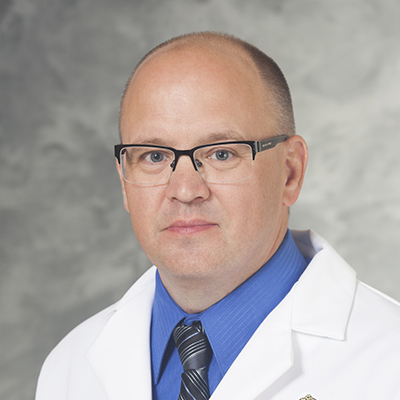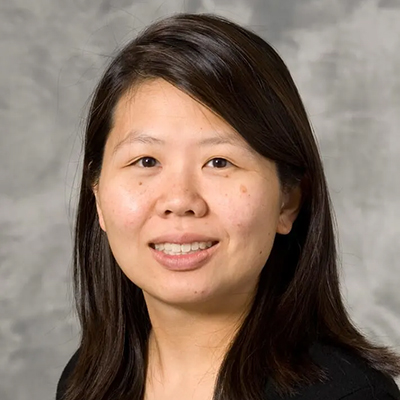
Co-leader: Deric Wheeler, PhD
Professor of Human Oncology
University of Wisconsin

Co-leader: Justine Yang Bruce, MD
Medical Oncologist
Associate Professor of Medicine
University of Wisconsin
Summary:
The primary objective of this proposal is to examine the cooperation of the receptor tyrosine kinases Axl and MerTK as drivers of an immunosuppressive tumor immune microenvironment (TIME) and if targeting tumor Axl and MerTK simultaneously can turn this suppressive TIME (cold) to an inflammatory TIME (hot).
Immune checkpoint inhibitors have gained FDA approval in the management of Head and Neck Cancer (HNC). Despite established benefit, clinical trials have highlighted that less than 20% of HNC patients respond to this promising new class of inhibitors. This suggests a gap in knowledge and represents a major clinical hurdle as we try to understand how best to enhance the immune system to better outcomes. Recent work from our laboratory has shown that Axl and MerTK cooperate to drive an immunologically cold environment. In addition, targeting tumor Axl or MerTK individually versus a new class of drug that targets both Axl and MerTK simultaneously, called INCB081776, revealed that dual targeting of Axl and MerTK was superior to targeting Axl or MerTK alone in immune models. Furthermore, INCB081776 potently inhibited tumor growth in immunocompetent mice but not in immunodeficient mice, demonstrating that a functional immune system is important. Treatment of syngeneic models with INCB081776 was associated with dose-related increases in the percentage of tumor-infiltrating effector CD4+ and CD8+ T cells as well as macrophages with the M1 phenotype. In addition, INCB081776 decreased the percentage of intratumoral M2 macrophages and monocytic myeloid–derived suppressor cell (M-MDSC) immune cell populations. Together, this suggests that simultaneous targeting of Axl and MerTK is superior in producing an anti-tumor (hot) TIME. Collectively, our data suggests that tumor Axl and MerTK work together to drive HNC via tumor intrinsic and tumor extrinsic (immune) mechanisms.
We hypothesize that tumor Axl and MerTK cooperate to produce a myeloid-suppressive TIME, through regulation of immune mediators, and that therapeutic strategies targeting tumor Axl and MerTK simultaneously will shift the immune TIME from cold to hot resulting in greater tumor kill. In Aim 1 we intend to define how tumor Axl and MerTK cooperate to regulate immune mediators that promote this cold TIME by recruiting myeloid derived precursor cells and driving M2 polarization ultimately leading to T cell suppression. In Aim 2 we intend to determine the impact of targeting tumor Axl and MerTK simultaneously in HNC syngeneic mouse models and measure the impact on immune cell infiltration (Macrophages and T cells) and tumor growth. Finally, in Aim 3, we propose a clinical trial to utilize this promising new drug, INCB081776, in patients and determine if it can shift a cold TIME to a hot TIME and if this impacts tumor growth in humans. To carry out these studies we have assembled a strong team of molecular biologists, translational physician-scientists, medical oncologist, radiation oncologist, pathologists and biostatisticians. This investigative strategy holds great promise for translation to the clinic and brings innovation by leveraging new molecular insights to a significant existing problem in HNC.
Specific Aims:
-
Aim 1: To determine if tumor Axl and MerTK cooperate to produce a cold TIME.
-
Aim 2: To measure the impact of simultaneous targeting of Axl and MerTK, in combination with ICI and radiation therapy (RT), on the TIME and tumor growth.
-
AIM 3: To perform a 12-patient pilot study of 1776 in combination with RT and anti-PD-1 checkpoint blockade in patients with recurrent or metastatic HNC.
Translational Significance
Dual inhibition of Axl and MerTK, can modulate the TIME from cold to hot in HNC and thereby enhance the immune system capacity to augment tumor cell killing. This will advance our knowledge to further strengthen the impact of immunotherapy in HNC.
Collaborators:

Zachary Morris, MD, PhD
Associate Professor and Vice Chair
Department of Human Oncology
University of Wisconsin

Mari Iida, PhD
Associate Scientist
Department of Human Oncology
University of Wisconsin